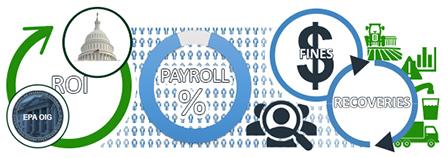Impact of OIG’s Work
The OIG is an independent office within the EPA that detects and prevents fraud, waste, and abuse, and promotes economy and efficiency to help the Agency protect human health and the environment more efficiently and cost effectively. The EPA inspector general also serves as the inspector general for the U.S. Chemical Safety and Hazard Investigation Board. These tangible examples illustrate how the OIG’s work has influenced positive changes:
- The U.S. District Court for the Eastern District of Michigan’s decision in Walters vs. Flint, issued on August 26, 2020, cited findings from OIG Report No. 17-P-0004, Management Alert: Drinking Water Contamination in Flint, Michigan, Demonstrates a Need to Clarify EPA Authority to OIG accomplishments for fiscal year 2020 Issue Emergency Orders to Protect the Public, issued on October 20, 2016. The decision recognized that our report made clear that the EPA did not take appropriate action after discovering that the City of Flint violated several federal drinking water standards and that EPA Region 5 had enough information to issue an emergency order to protect the city’s residents from lead-contaminated water as early as June 2015.
- At the beginning of the 2020 hurricane season, the EPA issued a news release that reminded facility owners they are obligated to minimize chemical releases and to report chemical or oil releases in a timely manner and as required by law. This action directly reflects the recommendations in OIG Report No. 20-P-0062, EPA Needs to Improve Its Emergency Planning to Better Address Air Quality Concerns During Future Disasters, issued on December 16, 2019, which recommended that the Agency develop a plan to inform communities near industrial areas of health risks and limit exposure to air toxics.
- The Texas Commission on Environmental Quality announced in November 2020 funding to upgrade two existing mobile air monitoring vans and to purchase a third van, with technology that will allow the state agency “to greatly expand the number of pollutants it monitors and more quickly analyze results.” This action follows OIG Report No. 20-P-0062, EPA Needs to Improve Its Emergency Planning to Better Address Air Quality Concerns During Future Disasters, which found that the TCEQ’s air monitors were turned off for days during Hurricane Harvey in 2017, including when some emissions events occurred.
What is the EPA OIG?
The Office of Inspector General is an independent organization that performs audits and investigations of the EPA to detect and prevent fraud, waste and abuse. Learn more

